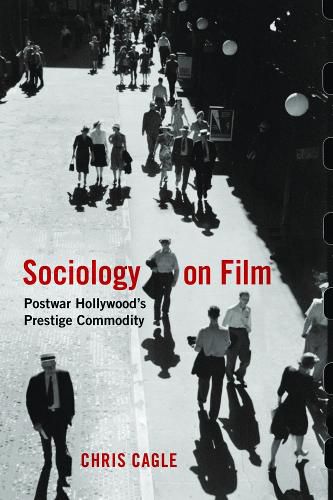Readings Newsletter
Become a Readings Member to make your shopping experience even easier.
Sign in or sign up for free!
You’re not far away from qualifying for FREE standard shipping within Australia
You’ve qualified for FREE standard shipping within Australia
The cart is loading…






After World War II, Hollywood’s
social problem films
- tackling topical issues that included racism, crime, mental illness, and drug abuse - were hits with critics and general moviegoers alike. In an era of film famed for its reliance on pop psychology, these movies were a form of popular sociology, bringing the academic discipline’s concerns to a much broader audience.
Sociology on Film examines how the postwar
problem film
translated contemporary policy debates and intellectual discussions into cinematic form in order to become one of the preeminent genres of prestige drama. Chris Cagle chronicles how these movies were often politically fractious, the work of progressive directors and screenwriters who drew scrutiny from the House Un-American Activities Committee. Yet he also proposes that the genre helped to construct an abstract discourse of
society
that served to unify a middlebrow American audience.
As he considers the many forms of print media that served to inspire social problem films, including journalism, realist novels, and sociological texts, Cagle also explores their distinctive cinematic aesthetics. Through a close analysis of films like Gentleman’s Agreement, The Lost Weekend, and Intruder in the Dust, he presents a compelling case that the visual style of these films was intimately connected to their more expressly political and sociological aspirations. Sociology on Film demonstrates how the social problem picture both shaped and reflected the middle-class viewer’s national self-image, making a lasting impact on Hollywood’s aesthetic direction.
$9.00 standard shipping within Australia
FREE standard shipping within Australia for orders over $100.00
Express & International shipping calculated at checkout
After World War II, Hollywood’s
social problem films
- tackling topical issues that included racism, crime, mental illness, and drug abuse - were hits with critics and general moviegoers alike. In an era of film famed for its reliance on pop psychology, these movies were a form of popular sociology, bringing the academic discipline’s concerns to a much broader audience.
Sociology on Film examines how the postwar
problem film
translated contemporary policy debates and intellectual discussions into cinematic form in order to become one of the preeminent genres of prestige drama. Chris Cagle chronicles how these movies were often politically fractious, the work of progressive directors and screenwriters who drew scrutiny from the House Un-American Activities Committee. Yet he also proposes that the genre helped to construct an abstract discourse of
society
that served to unify a middlebrow American audience.
As he considers the many forms of print media that served to inspire social problem films, including journalism, realist novels, and sociological texts, Cagle also explores their distinctive cinematic aesthetics. Through a close analysis of films like Gentleman’s Agreement, The Lost Weekend, and Intruder in the Dust, he presents a compelling case that the visual style of these films was intimately connected to their more expressly political and sociological aspirations. Sociology on Film demonstrates how the social problem picture both shaped and reflected the middle-class viewer’s national self-image, making a lasting impact on Hollywood’s aesthetic direction.